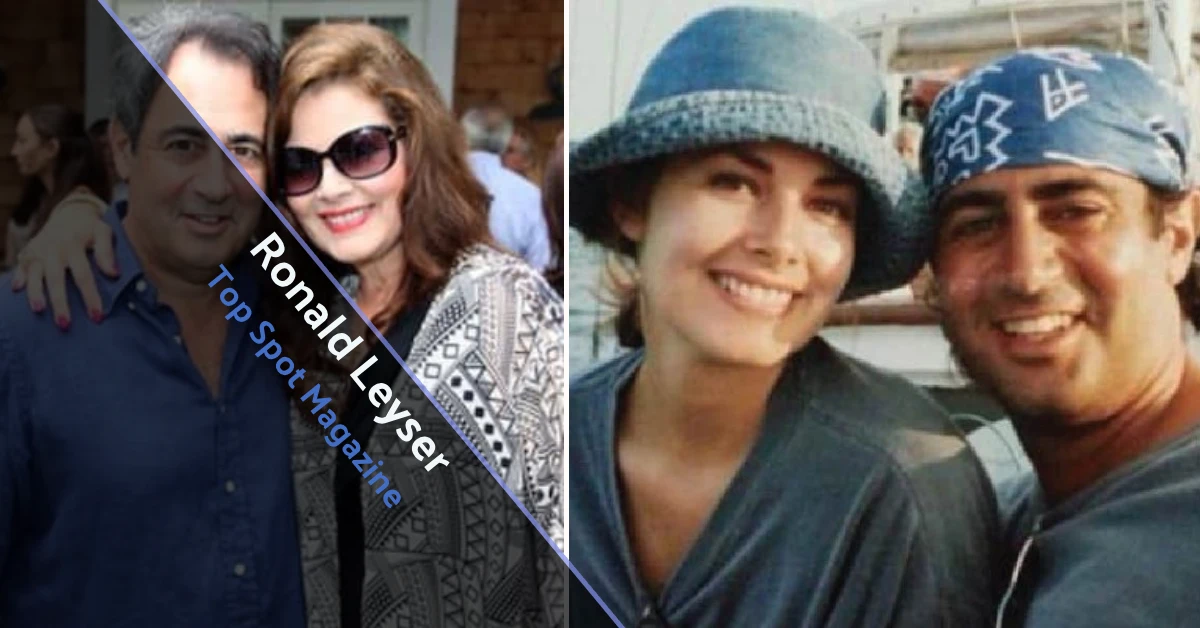You’ve probably heard of Ginger Alden—Elvis Presley’s last girlfriend before he died in 1977. But what about the man she spent decades with after? Ronald Leyser wasn’t chasing headlines or red carpets. He was the guy behind the camera, building commercials that moved people, raising a family, and living life on his own terms. Let’s dig into who this creative actually was.
Who Was Ronald Leyser?
Ronald Leyser was a commercial film director who married Ginger Alden in 1991, building a quiet legacy in advertising and family life. Born around 1954, he spent his career crafting visual stories that sold products while keeping his personal world refreshingly private. Most people stumble across his name through the Elvis connection, but Ron’s story stands on its own merit without needing that spotlight.
He founded L-evation Media, directing commercials throughout the ’80s and ’90s when TV advertising was basically printing money for creative minds. Ron understood something crucial: you don’t need fame to live a meaningful life. While his wife carried the weight of being forever linked to the King of Rock and Roll, Ronald gave her something Elvis’s world never could—normalcy.
The guy never wrote a tell-all book. Never leaked stories to tabloids. He just showed up, did the work, loved his family, and kept moving forward. That’s rare, especially when you’re married to someone the world thinks it owns a piece of. Ronald Leyser chose substance over spectacle, and honestly, that’s the most interesting thing about him.
The Commercial Director Who Stayed Off Camera
Ronald Leyser built his reputation directing commercials during advertising’s golden era, when a 30-second spot could make or break a brand. He had that rare combo of artistic vision and business savvy—knowing how to tell a story that sells without feeling like a sales pitch. His peers described him as meticulous, professional, and someone who let the work speak instead of shouting about it.
Back then, commercial directing wasn’t just pointing cameras at products. You needed to understand human psychology, visual composition, and how to compress emotion into seconds. Ron mastered this craft when most directors were still figuring out how MTV changed everything. He wasn’t creating Super Bowl ads that everyone remembers, but steady, solid work that kept clients coming back.
L-evation Media became his creative playground. The company let him take on diverse projects without answering to some corporate overlord breathing down his neck. This independence meant Ronald Leyser controlled his output, his schedule, and ultimately, his reputation. Freedom matters more than fame when you’re playing the long game.
Industry folks who worked with Ron mention his calm demeanor on set. No drama, no ego tantrums, just professional execution. That approach might not make for exciting behind-the-scenes stories, but it builds careers that actually last. Ronald understood something most creatives learn too late: consistency beats viral moments every single time.
Meeting Ginger Alden: Love After Elvis
After Elvis died in 1977, Ginger Alden moved to New York, trying to rebuild her identity beyond “Elvis’s fiancée.” That’s where Ronald Leyser entered the picture—a filmmaker who saw her as Ginger, not as Elvis’s eternal footnote. Their meeting wasn’t some Hollywood rom-com moment. It was two people finding a connection when neither was looking for cameras.
They married in 1991, over a decade after Elvis’s death. By then, the media circus had mostly moved on to fresher scandals. Ron gave Ginger something priceless: a partner who didn’t need her past to validate his present. He never tried capitalizing on her Elvis connection, never pushed her to do reunion specials or exploitation documentaries.
Their relationship worked because Ronald respected boundaries most people would’ve trampled. Ginger’s history with Elvis was hers to share or not share. Ron supported her when she eventually wrote her memoir “Elvis and Ginger,” but he stayed out of the narrative. That takes serious confidence and emotional maturity—qualities that don’t trend on social media but build lasting partnerships.
Together, they had a son, Hunter Leyser, completing their family unit. Ron focused on being a present father, not a celebrity dad. The Leysers settled in Sag Harbor, Long Island, choosing coastal quiet over Manhattan chaos. Distance from Hollywood wasn’t accidental—it was intentional design.
Building a Private Life in Sag Harbor
Sag Harbor became the Leyser family sanctuary, far from Memphis tourism and paparazzi hunting Elvis connections. This Long Island community offered exactly what Ronald valued: artistic types who minded their business, beautiful scenery, and zero tabloid pressure. Here, he was just Ron—the commercial director raising his kid, not “Ginger Alden’s husband.”
Their home life centered on normalcy. School runs, family dinners, weekends without security teams. Neighbors described them as friendly but private, involved in their son’s life without making everything a production. Ronald created the stable environment that Ginger probably craved after years of being Elvis’s public girlfriend during his most troubled period.
The choice to live in Sag Harbor reflected Ron’s entire philosophy. He’d rather have authentic relationships in a small town than superficial connections in entertainment capitals. Money didn’t dictate lifestyle—values did. That’s refreshing when most people tied to major celebrities squeeze every drop of proximity fame they can.
Hunter Leyser grew up with parents who valued privacy, creativity, and groundedness. Ron made sure his son had choices Elvis’s world never allowed. No forced spotlight, no predetermined path, just support for whatever Hunter wanted to become. That’s legacy work most people overlook.
The Creative Philosophy That Defined His Work
Ronald Leyser approached filmmaking like a craftsman, not a celebrity. His commercials prioritized emotional truth over flashy gimmicks. He understood that people buy feelings, not features—your ad needed to make them feel something real in thirty seconds flat. This emotional intelligence separated decent directors from ones clients actually wanted.
Ron believed good work compounds over time. One solid campaign leads to another, then another, building reputation through consistency rather than viral accidents. This philosophy meant steady income and creative freedom—he wasn’t hustling for the next big break because he’d built sustainable demand. Smart business disguised as artistic integrity.
His sets reportedly felt calm, focused spaces where creativity flowed naturally. No screaming matches, no manufactured urgency, just professionals doing professional work. That environment attracted quality crews and clients who valued results over drama. Ronald Leyser proved you don’t need chaos to create compelling content.
He also knew when to stay behind the camera. While others chased on-screen recognition, Ron found satisfaction in the craft itself. The work mattered more than credit, the outcome more than ego validation. This mindset kept him working decades after flashier directors burned out chasing spotlights.
Health Struggles and Final Years
During his later years, Ronald Leyser faced serious health challenges, including cancer. He handled illness with the same private grace he’d applied to everything else—no public battles, no fundraising campaigns, just family support and quiet dignity. This wasn’t hiding; it was choosing who deserved access to his most vulnerable moments.
Ron died on August 16, 2015, at age 61. The date carries haunting significance—August 16 is also when Elvis Presley died in 1977. This coincidence didn’t go unnoticed, especially among Elvis fans who see meaning in everything connected to the King. For Ginger, it meant both men who profoundly shaped her life shared a death date.
He was laid to rest at Oakland Cemetery in Sag Harbor, keeping him close to the life he’d built there. The burial location choice reflects everything Ronald valued: community over celebrity, privacy over spectacle, roots over restlessness. Even in death, he stayed true to himself.
His passing left a void for family and colleagues who knew him as more than Ginger’s husband. Those relationships, built on mutual respect and genuine connection, matter more than any Wikipedia entry ever could. Ronald Leyser’s legacy lives in the memories of people who actually knew him.
The Legacy of Living Authentically
Ronald Leyser’s story matters because it shows that success doesn’t require fame. He built a meaningful career, supported his family, and maintained integrity in an industry that often rewards the opposite. His work touched millions through commercials, even if they never knew his name. That’s impact without ego.
He gave Ginger Alden space to be herself after years of being defined by someone else. Their marriage proved you can honor someone’s past without living in its shadow. Ron never competed with Elvis’s memory—he built something entirely different with the woman who’d moved beyond it.
His approach to privacy in our oversharing era feels almost radical. Ronald understood that not everything needs an audience. Some moments, relationships, and struggles deserve protection from public consumption. That wisdom feels increasingly rare as everyone broadcasts everything.
For those who worked with him, Ronald Leyser represents professionalism and reliability—qualities that don’t trend but sustain careers. He showed up, delivered quality work, treated people well, and went home to his family. Simple formula, rare execution.
Remembering the Man Behind the Camera
Most people searching for Ronald Leyser are really looking for Elvis connections. They want another angle on that famous story. But Ron’s life offers something better: a blueprint for living meaningfully without chasing spotlights. He proved you can be connected to extraordinary circumstances without being consumed by them.
His marriage to Ginger Alden worked because he saw her as a whole person, not a historical artifact. That perspective—treating people like people rather than their most famous relationship—feels revolutionary in our celebrity-obsessed culture. Ronald gave Ginger normalcy, and she gave him partnership.
The fact that he died on August 16, matching Elvis’s death date, adds poetic symmetry to Ginger’s story. Two chapters of her life, both ending on the same calendar square. For Ginger, that date carries complex layers of loss, memory, and reflection that only she fully understands.
Ronald Leyser won’t fill Wikipedia like Elvis does. His commercial work isn’t preserved like blockbuster films. But he left something more valuable: a family who knew him as Dad and husband, colleagues who respected his craft, and a life lived according to his values. That’s the legacy most of us actually want.

